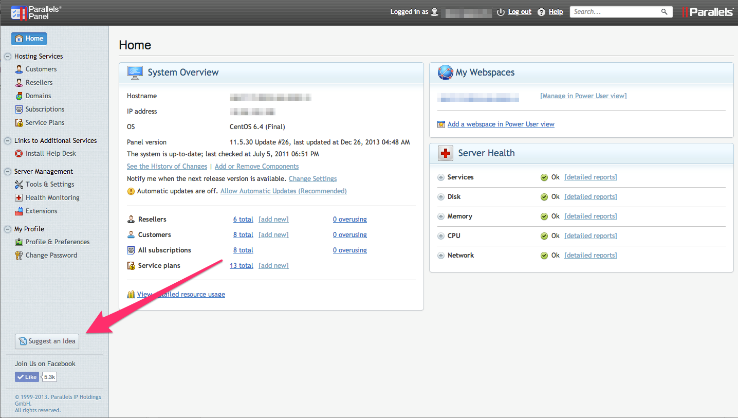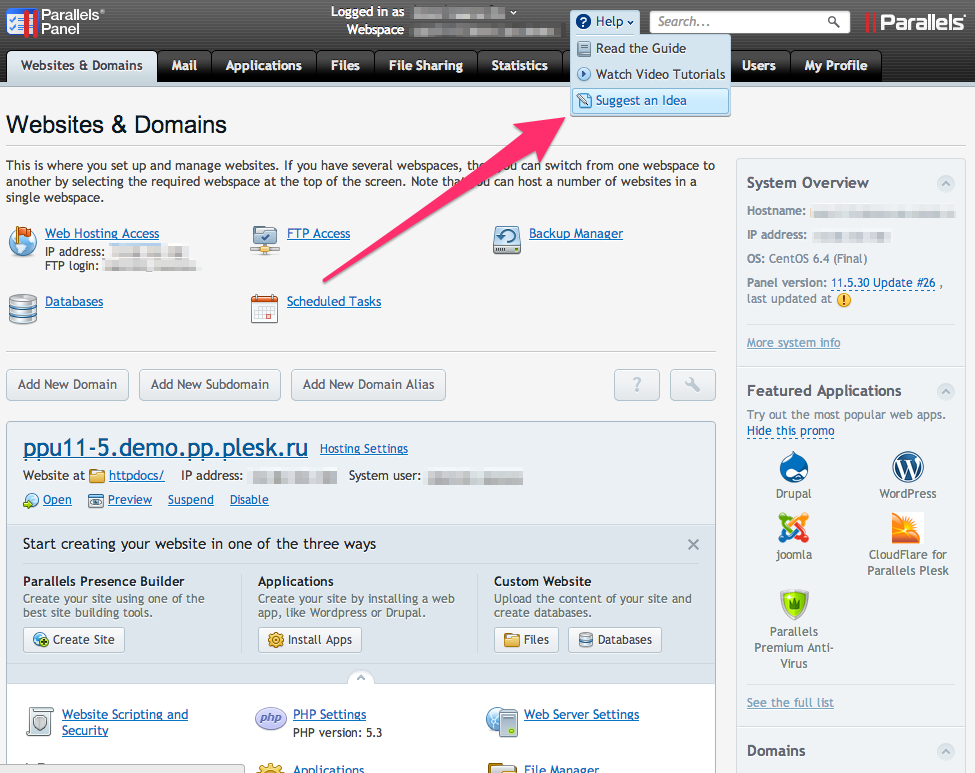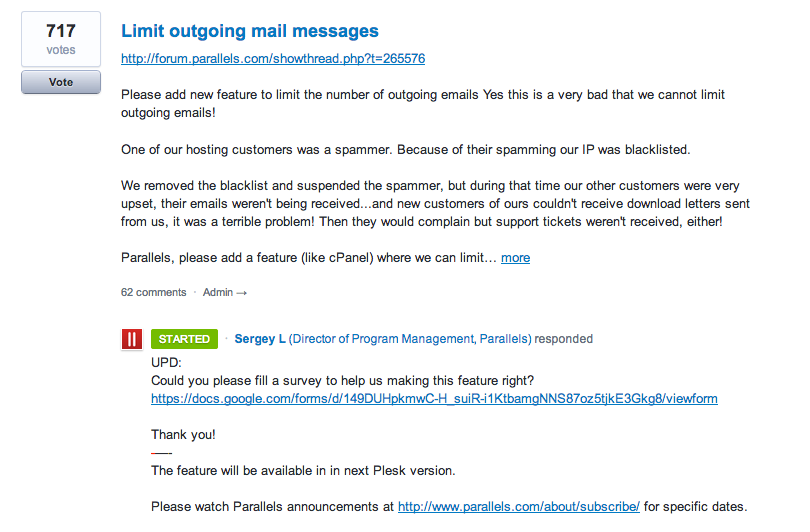Democracy in development: how Parallels uses customer voting to create new features
Probably, many users believe that they know much better what developers should have in their product features. And we really listen with interest to all their suggestions. The problem is different - you can collect 1000 opinions, but you can’t do 1000 different things (and it makes no sense).
To work more efficiently on our Parallels Plesk product, we decided to launch a system where every user can speak, and we can focus on the most important. As a means of implementation, we tried the Saerv solution Uservoice . And although at first we didn’t like it, the final results pleased us - the problem was solved with minimal resources.
Even if only one out of a hundred people offers us something, then with our user base it is already tens of thousands of people. In practice, this is more than a thousand offers through various channels - a sales service, technical support, a public forum, etc. And these are only formally considered proposals. It is very difficult to process such a volume manually - to group repeated offers, to clarify the details for each. In practice, processing only fresh receipts took at least 8 hours a week.
A separate problem: not all users of the product are our customers: most of our market is served by distributors, and many direct communication channels with us are not available to their customers. And although feedback is being given to us in some form, there is a deaf phone.
The idea of establishing a more ordered interaction through open voting actually lay on the surface. We ourselves used to practice voting in closed expert groups. Technically, it was necessary to expand the concept of a group to almost all users.
First, several services and applications came into view, including Uservoice.com , a SaaS service that offers web services for collecting and processing various kinds of feedback. But at the first review, we rejected it, as we were looking for a “Universal Platform” that we could flexibly customize for ourselves. And Uservoice.com looked very, very limited - there are practically no settings.
But then the prospect of spending many hours setting up, configuring and evaluating solutions loomed ahead, and then also the unknown amount of labor for their maintenance, updates, crashes, debugging, etc. And we decided to take the issue easier. Uservoice.com satisfied basic needs, didn’t require any financial investments (we started on a free account), the time spent is minimal - one (even a wry-handed) manager can do everything himself in a few hours. In this minimalistic format, we started in February 2013 with the plesk.uservoice.com portal , which allowed users to ask us for a new feature or to support existing requests with their votes. Full lean, we did not even transfer the portal to our zone and left it at .uservoice.com.
Some fears were inspired by the fact that we had previously tried voting for several products from the Parallels clip, and they had a rather modest effect. For example, users rather intensively asked for some function on different channels, but did not want to vote for it later.
Therefore, the launch of the portal was approached as a full-fledged project in several stages:
• “Sowed” it with proven, good features that are definitely needed and useful.
• At the second stage, we invited a group of product experts from our forum, who voted first and made other high-quality requests.
• Invited other users from our forum
• Opened the portal publicly, directly building into the product:


Of course, with such a campaign, the initial “explosion” could not have any ideas: the first 10 were ours, the next month 14 more were received - from users already. For more than a year of work, the number of requests has exceeded 600. On the day we receive 1-3 new requests and a few comments and votes to existing ones.
The portal has not yet completely supplanted the other channels for receiving proposals, but more and more often we offer the user to simply get it on plesk.uservoice.com . Once it is supported by a significant number of people, it will be considered with priority. This especially helps in processing offers with non-obvious value.
Although the portal was launched when the next version - Parallels Plesk Panel 11.5 - was already fully planned, in that release we closed as many as 28 requests from the portal. Although these functions were planned independently, we were very pleased with this coincidence between our views and user-defined ones. Currently, another 19 requests have been implemented, some of which have already been released in version 12.0. Actually, Plesk 12.0 is about to be released, and now we invite voters to join the beta testing of the new version .
This is another convenience of the system, it is worth updating the status of the proposal and all those who vote for it receive a notification. We used this both to collect additional information (by posting polls in status), and to invite to testing

You can give a typical example of discussion and implementation of the request. For example, there is a very popular feature - to limit sending outgoing mail from the server . It is needed to prevent spamming through your server if the password of any user (mail, ssh, ftp) was stolen by a Trojan from someone’s machine into unkind hands.
The function is not very simple, since it is necessary to reliably identify on behalf of which user the mail is sent. About a year and a half or two ago, we preferred to give a third-party solution to this problem, but it did not cope well, so we decided to withdraw it from the sale and provide our own development.
However, in practice, each user in practice imagined the implementation of these restrictions differently. For example, when we sent out a poll with two options - A, B or “Other”, 80% answered “Other”. We realized that we had missed something important, revealed an additional scenario and very much re-planned the development.

It happens that our developers so light up some of the proposals that they implement experimental solutions that we are not yet ready to fully support.

It should also be noted that rarely a proposal makes sense to do exactly as asked. A wish is rather a designation of a problem or need, for which fairly different solutions can be proposed.
Currently, the same portal is being launched for another product - Parallels Plesk Automation ( http://pleskautomation.uservoice.com/ ), this is Plesk ’s older brother with the ability to manage multiple servers.
So, if you have any suggestions for the product, then you should visit Plesk.uservoice.com , and if you have questions about the experience of using uservoice, then in the comments.
To work more efficiently on our Parallels Plesk product, we decided to launch a system where every user can speak, and we can focus on the most important. As a means of implementation, we tried the Saerv solution Uservoice . And although at first we didn’t like it, the final results pleased us - the problem was solved with minimal resources.
Even if only one out of a hundred people offers us something, then with our user base it is already tens of thousands of people. In practice, this is more than a thousand offers through various channels - a sales service, technical support, a public forum, etc. And these are only formally considered proposals. It is very difficult to process such a volume manually - to group repeated offers, to clarify the details for each. In practice, processing only fresh receipts took at least 8 hours a week.
A separate problem: not all users of the product are our customers: most of our market is served by distributors, and many direct communication channels with us are not available to their customers. And although feedback is being given to us in some form, there is a deaf phone.
The idea of establishing a more ordered interaction through open voting actually lay on the surface. We ourselves used to practice voting in closed expert groups. Technically, it was necessary to expand the concept of a group to almost all users.
How to choose
First, several services and applications came into view, including Uservoice.com , a SaaS service that offers web services for collecting and processing various kinds of feedback. But at the first review, we rejected it, as we were looking for a “Universal Platform” that we could flexibly customize for ourselves. And Uservoice.com looked very, very limited - there are practically no settings.
But then the prospect of spending many hours setting up, configuring and evaluating solutions loomed ahead, and then also the unknown amount of labor for their maintenance, updates, crashes, debugging, etc. And we decided to take the issue easier. Uservoice.com satisfied basic needs, didn’t require any financial investments (we started on a free account), the time spent is minimal - one (even a wry-handed) manager can do everything himself in a few hours. In this minimalistic format, we started in February 2013 with the plesk.uservoice.com portal , which allowed users to ask us for a new feature or to support existing requests with their votes. Full lean, we did not even transfer the portal to our zone and left it at .uservoice.com.
Launch
Some fears were inspired by the fact that we had previously tried voting for several products from the Parallels clip, and they had a rather modest effect. For example, users rather intensively asked for some function on different channels, but did not want to vote for it later.
Therefore, the launch of the portal was approached as a full-fledged project in several stages:
• “Sowed” it with proven, good features that are definitely needed and useful.
• At the second stage, we invited a group of product experts from our forum, who voted first and made other high-quality requests.
• Invited other users from our forum
• Opened the portal publicly, directly building into the product:


the effect
Of course, with such a campaign, the initial “explosion” could not have any ideas: the first 10 were ours, the next month 14 more were received - from users already. For more than a year of work, the number of requests has exceeded 600. On the day we receive 1-3 new requests and a few comments and votes to existing ones.
The portal has not yet completely supplanted the other channels for receiving proposals, but more and more often we offer the user to simply get it on plesk.uservoice.com . Once it is supported by a significant number of people, it will be considered with priority. This especially helps in processing offers with non-obvious value.
Correlation with implemented functions
Although the portal was launched when the next version - Parallels Plesk Panel 11.5 - was already fully planned, in that release we closed as many as 28 requests from the portal. Although these functions were planned independently, we were very pleased with this coincidence between our views and user-defined ones. Currently, another 19 requests have been implemented, some of which have already been released in version 12.0. Actually, Plesk 12.0 is about to be released, and now we invite voters to join the beta testing of the new version .
This is another convenience of the system, it is worth updating the status of the proposal and all those who vote for it receive a notification. We used this both to collect additional information (by posting polls in status), and to invite to testing

You can give a typical example of discussion and implementation of the request. For example, there is a very popular feature - to limit sending outgoing mail from the server . It is needed to prevent spamming through your server if the password of any user (mail, ssh, ftp) was stolen by a Trojan from someone’s machine into unkind hands.
The function is not very simple, since it is necessary to reliably identify on behalf of which user the mail is sent. About a year and a half or two ago, we preferred to give a third-party solution to this problem, but it did not cope well, so we decided to withdraw it from the sale and provide our own development.
However, in practice, each user in practice imagined the implementation of these restrictions differently. For example, when we sent out a poll with two options - A, B or “Other”, 80% answered “Other”. We realized that we had missed something important, revealed an additional scenario and very much re-planned the development.

It happens that our developers so light up some of the proposals that they implement experimental solutions that we are not yet ready to fully support.

It should also be noted that rarely a proposal makes sense to do exactly as asked. A wish is rather a designation of a problem or need, for which fairly different solutions can be proposed.
Exploitation
- Cheat. Since the portal is a third-party solution, we practically do not control this issue and were a little worried. However, uservoice.com successfully blocked a single attempt.
- Trash and negativity. It is too little. Most likely, because a smooth start made it possible to establish certain standards, which were then followed simply “according to the model”, motivating the audience to behave constructively. However, there are some examples of misuse; they can be divided into two groups.
- Pointless and unconstructive suggestions. For example, “make it cheaper”, “do it for free”, “you have poor support”, “you work poorly”, “in vain you changed it.” There are not very many of them, and we can afford to answer them constructively without slipping into a banal ban. There are two main approaches:
- ask for additional information (tell us what exactly is broken) and then transfer the request to the “need info” status.
- help than we can. For example, to say “we do not plan to free, but there are cheap versions, and there is a free trial”, and this closes the request.
- Requests to solve the problem on a specific server and bug reports. Requests for fixing something, as well as messages about bugs on the portal, are undesirable. We have it clearly written, but if you still get something started, then we still try to process it. If the problem is identifiable, then let us know the known solution and close the request. If the bug is reproduced, then fix it and close it. But if the problem is poorly described and / or the author does not answer the questions - of course, close the request as non-core.
- Pointless and unconstructive suggestions. For example, “make it cheaper”, “do it for free”, “you have poor support”, “you work poorly”, “in vain you changed it.” There are not very many of them, and we can afford to answer them constructively without slipping into a banal ban. There are two main approaches:
- Localization. The portal is maintained in English, and at times we are asked when will its version be in Russian or another language. Definitely not in the near future. Our product is geographically widespread. English allows us to work with everyone, and people from different countries to support each other’s proposals with their voices. Launching a localized version would lead to an obvious problem: for one Russian-speaking client there are at least 40 clients with native English, and another 40 with English as a second language, respectively, “Russian” offers would inevitably have a lower rating than “English”.
So far, uservoice only offers the creation of separate forums for each language in Premium rates. But we are not at all happy with the existence of several independent systems with different priorities. The solution to this problem lies partially with uservoice - support for multilingual forums is needed ( which is not yet available ). The second half is ours; organization of a regular translation of national proposals into English will be required.
What is the result?
- Yes, at the very beginning we did not like uservoice.com - it’s beautiful, but there are very severe restrictions. But in the course of choosing the software, they came to the conclusion that spending time on maintaining and configuring your own system is inefficient. Therefore, we chose a third-party SaaS solution.
- The calculation as a whole was justified, we are used to its limitations, they turned out to be uncritical. We spend time only working with the system in essence - replies and status updates. Its maintenance costs us 0 hours 0 minutes per month.
- The portal allows us to effortlessly single out the most requested requests (by the number of votes) from the huge total volume and work closely with the most important. The portal’s ability to offer the user similar offers from already established ones helps in response to the text they type. This allows you to drastically reduce the number of duplicate offers.
Currently, the same portal is being launched for another product - Parallels Plesk Automation ( http://pleskautomation.uservoice.com/ ), this is Plesk ’s older brother with the ability to manage multiple servers.
So, if you have any suggestions for the product, then you should visit Plesk.uservoice.com , and if you have questions about the experience of using uservoice, then in the comments.
